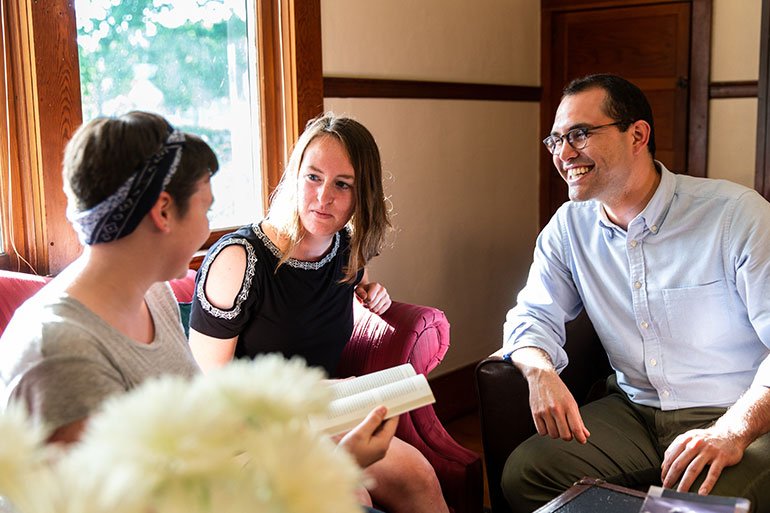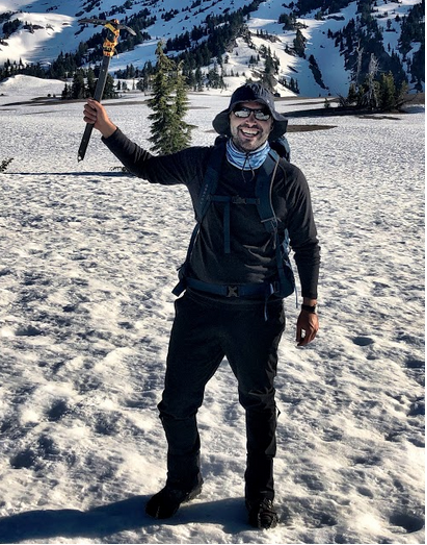Dr. Javier Garcia: A Life of Faith, Laughter, and Love
By: Mckenna Lloyd
Nov. 19th was the 5 month anniversary of former Honors Program Director Dr. Javier Garcia's death, but his memory and life remain active in many ways. He is remembered by students and faculty alike for the impact he had on their lives. Who was Garcia for some of those on campus closest to him?
Dr. Javier Garcia. Photo courtesy: GFU
Before becoming Director of the Honors program, Garcia served as Associate Director under Dr. Abigail Favale after they were both Associate Directors under Dr. Joseph Claire. Favale remembered the day she met Garcia, thinking "That guy is going to be a rockstar."
Her first interaction with Garcia was in preliminary interviews for the Associate Director position in Atlanta, Ga. Favale recounted that Garcia was "gunning for the job" at George Fox University (GFU), despite her belief that "he could go anywhere." Favale described Garcia's personality as an academic as having a "very diligent work ethic. [He was] very committed to what he was doing," as well as being "incredibly smart." These were traits that already stood out to her upon their first meeting.
As a friend and colleague, Favale said that Garcia was fun, constantly cracking jokes and lightening the room. "When I think about Javier, I think about his huge smile and laugh, like his big laugh where he would kind of double over," she said.
Dr. Javier Garcia. Photo courtesy: GFU
Favale highlighted Garcia's faith and its importance to him, both in the classroom and in his personal life. She remembered a late night conversation they had at Camp Tilikum while on the annual Honors retreat for first year students in which the two shared more about their personal lives. "We have these interesting, almost mirror opposite stories," Favale explained, as she grew up evangelical and became Catholic, while Garcia was baptized as a Catholic and later became an evangelical. "Even though he was not Catholic and I was, I always felt so supported by him. I know he respected me and my faith and it was mutual, absolutely mutual."
About Garcia's impact on the Honors Program, she emphasized his contribution to the spiritual formation of the program. "Javier really shaped the spiritual formation aspect of the program and the community building aspect of the program," she said, citing how Garcia organized Monday night evening prayer and orchestrated the spiritual retreats and formation lectures put on by the Honors Program.
For students and faculty who did not have the chance to meet Garcia, Favale said "they're missing out. He was so full of life and joy." She was "overwhelmed with gratitude that [she] knew him" and was thankful that he spent six years at GFU.
Echoing Garcia's belief that he was led to GFU by Providence, Favale said about his coming to GFU: "There are moments when God kind of pulls back the curtain a little bit and you can really see [Providence at work]. I definitely think that Javier coming here was very much a God thing."
Another professor involved in the Honors Program, Dr. Brian Doak was close friends and short-term housemates with Garcia. Garcia and Doak were more friends than colleagues. "I don't even think of him as a colleague or an academic. Those things have kind of faded away for me. But they were also intertwined really closely with the friendship that I had with him," said Doak.
As his friend, Doak described Garcia as "warm and bright. He was kind of like a lot of sunshine to someone like me and he had a kind of faith that was rare on earth." Doak stressed that Garcia found it important to be vulnerable and humble around those he was close to. Garcia shared with Doak that "He struggled with back pain. He struggled with loneliness. He struggled to find his place in the world." Doak explained that often for men it's hard "to have or be a friend." But Garcia was "someone who had [friendship] genuinely to offer to the world, and certainly to [Doak]."
Dr. Javier Garcia and Dr. Doak. Photo courtesy: GFU
Garcia lived with Doak and his family from April 2020 to September 2020, "Covid months" according to Doak. "It almost felt like I was living in a dorm, like we were college students or something," said Doak about the time living with his good friend. He also shared that for Doak's two daughters Garcia became "like an older brother or an uncle."
One story Doak shared about the time he spent with Garcia as his housemate involved the family's pool and a large, inflatable unicorn: "There was this joke that it was his girlfriend. He was always out there reading the newspaper in the middle of the day."
Doak described how, during the time Garcia lived with the Doak family, they found opportunities to celebrate in small ways throughout the week. "On Fridays it was like it was this kind of party every week. So it was a chance for me to be like a kid again which is a beautiful thing that he brought to the world" remembered Doak. Garcia brought "just a youthful, fun energy."
Like Favale, Doak appreciated his friend's sense of humor and comedic side. The two would go hiking and mountaineering together. Garcia's humor was not lost on the mountains. Doak recalled that often on hikes Garcia would "complain. But it was like funny complaining, like just over the top complaining, just constantly." Later Garcia would always "tell stories of these hikes but would exaggerate them beyond any kind of reasonableness about how hard it was, saying things like 'The snow was up to our necks and we were dying.'"
Doak's concluding thought on his friend was that "he embodied and preserved something that we all needed in our lives, which is optimism, and energy, and love, and openness to people and to ideas."
Admissions Specialist and recent alumna of the Honors Program, Brenna McGuire was one of Garcia's students. Garcia was important to McGuire's final thesis for the Honors Program.
Though closely involved in her academic performance, McGuire stressed that Garcia was more concerned for his students' well being than their grade. "As a professor it was very evident that he was more concerned about whether his students were learning from whatever they were reading or whatever writing assignment there was," she said. McGuire explained that Garcia's interests were in asking questions like "'What are you gleaning from this? What are you learning from this?'" before he was interested in asking questions about their grades.
Garcia also specifically encouraged McGuire in the classroom. She related an instance in which he called on her in a seminar to share her personal thoughts on something. "He was just like, 'Oh, Brenna, you should take this.' But it was not in a putting-me-on-the-spot way," she said, "but [he] was just very genuinely encouraging. And to know that came from somebody I respected so much intellectually and from a spiritual and religious perspective, it was really valuable to hear."
McGuire wanted the community to know about the way Garcia carried himself and interacted with people. "He embodied the ethos and the charity of the entire honors program," she claimed. "The way that he pursued relationships with other faculty members, with students, was so genuine and so Christlike," said McGuire. She elaborated "there's nobody else that I have met who has ever lived in such an obviously Christlike way." McGuire's conversations with Garcia have remained with her post-graduation and especially as she considers what she wants to do for her career.
Continuing to grieve his loss and keeping his memory alive, students in the Honors Program were invited to meet together for a time to remember their dear professor on Nov 14. Students who knew Garcia gathered at the Honors Program's Pennington House for an unstructured time to share Garcia's puns and tell stories of their experiences with him.
The group was small but full of love, tears, and laughter in remembrance of their professor. Garcia made a memorable impact on the community he served and the students' memories of him echoed this fact. He taught seminars for many students and often looked fashionable while doing so. The Honors Program and the GFU community continue to commemorate Garcia, in informal gatherings and in the opening of the Garcia Reading Room in the Armstrong House.
Dr. Javier Garcia. Photo courtesy: GFU




